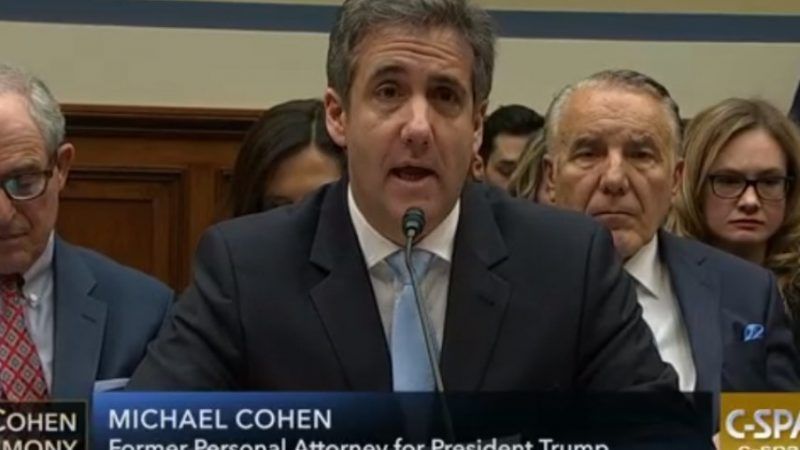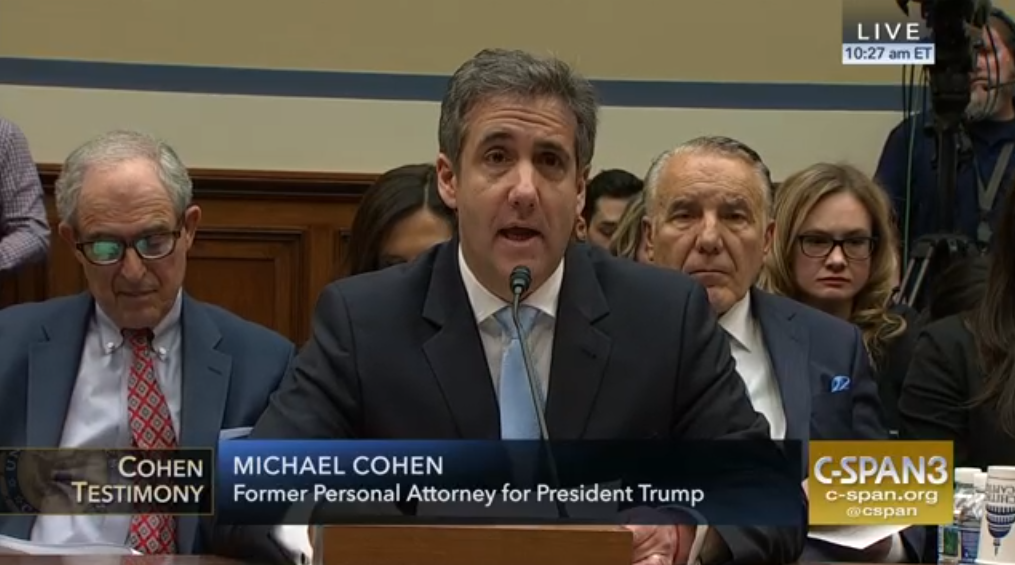Michael Cohen Acknowledges His Own Lies While Calling Out Trump's
"I can only warn you that the people who follow Trump as I did, blindly, are going to suffer the same consequences that I did."


"I am not protecting Mr. Trump anymore."
That was how Michael Cohen, former attorney for President Donald Trump, responded to repeated observations Wednesday from Republicans on the House Oversight Committee that Cohen was about to go to jail for lying to Congress.
Cohen spent the day taking questions (and listening to speeches) from Republicans and Democrats about his role in secretly paying porn star Stephanie Clifford, a.k.a. Stormy Daniels, to keep silent about sexual encounters with Trump. The payments were meant to protect Trump's election chances in 2016. Cohen also attempted to explain what he knew about negotiations between Trump World and Russian officials as the president sought to build a Trump hotel in Moscow; and what he might have known about attempts by Russian officials to meddle in the 2016 election.
The release last night of Cohen's opening statement set the stage for today's show, and that's not entirely a metaphor—much of what happened today was a performance from everybody involved.
In his testimony, Cohen declared that Trump was a conman, a cheat, and a racist. Cohen also provided a copy of a check signed by Trump after he'd taken office that Cohen says was part of the payment for Daniels' silence.
The former attorney, who was disbarred this week, also testified that Trump knew throughout the campaign about ongoing hotel negotiations with Moscow and that he lied about it. "There was nothing that happened that did not go through Trump," Cohen said.
Cohen claims that statement applies to his previous lies to Congress. While conceding that Trump didn't directly order him to lie, Cohen claimed that Trump essentially establishes a "party line" that his staff are expected to comply with. He also said White House lawyers saw and edited his previous testimony to Congress.
Cohen, who served Trump for a decade as his lawyer, will soon begin serving three years in federal prison for eight counts of tax evasion and election fraud. The election fraud charge resulted from his role in directing payments from Trump to Daniels. He was also sentenced to two months in jail for lying to Congress in his previous testimony.
Most Republicans on the committee spent much of their time today attacking Cohen's credibility and questioning why someone who had been convicted of lying to Congress had been invited to testify again. He previously told Congress that Trump and his associates had stopped negotiating with representatives of the Russian government to build a hotel in Moscow prior to the 2016 primaries. Those talks actually continued on through the summer of 2016. In response, Cohen—and Democrats on the committee—pointed out that Cohen was tring to protect Trump.
Republican skepticism is understandable. Cohen lied in his first appearance while claiming to tell the truth. What's to say he wasn't lying again today? Several representatives also made it clear they saw Cohen's testimony on Wednesday as another means of profiting off his relationship with Trump. When asked, Cohen declined to say that he would refuse future opportunities to sell book or film rights.
But amid all the speeches and questioning, there were very few attempts by Republican members of the committee to actually contradict anything in Cohen's lengthy statements. Instead, they focused on attacking his credibility as a witness. Only Rep. Greg Stuebe (R–Fla.) noted that the check Cohen provided doesn't necessarily prove Trump knew about the Daniels payoff (why else he would've given Cohen that money was not discussed).
Thus far, there is little to corroborate Cohen's other claims, many of which did not concern potentially illegal activity. While Cohen says that he was in Trump's office when Roger Stone called to tell Trump that Wikileaks was about to release emails that Russian operatives stole from Hillary Clinton's campaign, Stone has denied this conversation ever took place.
Meanwhile, Cohen's claims about Trump's racism led to an absurd sideshow of Rep. Mark Meadows (R–N.C.) dragging up a minority woman on Trump's staff (Lynne Patton, who planned Eric Trump's wedding and is now a Housing and Urban Development official) to stand next to him as some sort of proof that Trump cannot possibly be a racist. The moment was every bit as awkward and tone deaf as it sounds.
A tremendous amount of what has happened today will simply cement existing biases. While Cohen is not a terribly credible human being, that doesn't necessarily mean he should be dismissed out of hand. Over at the National Review, David French has a useful primer on how to evaluate the testimony of somebody with a sketchy relationship to the truth.
It's also worth noting that one Republican deviated from his party's talking points: that Cohen was fundamentally untrustworthy, is looking for mercy from the feds on his sentencing, and is planning to cash in on his time with Trump. Rep. Justin Amash (R–Mich.), after getting some clarification from Cohen about how he was able to figure out when Trump wanted him to lie, asked, "What is the truth that you know President Trump fears most?"
We didn't get an answer to that question, and it clearly threw Cohen for a loop. Cohen said he didn't really know the answer. Amash followed up with, "What principles did you follow and do you wish to change those principles?" Cohen said that he wants to get his life back, and when prodded by Amash, said he's trying to live under a new (and presumably more honest) set of principles.
Amash's deviation from the norm prompted a tweet from Nate Silver's FiveThirtyEight to inform a potentially surprised audience that Amash is no Trumpist:
Republican Rep. Justin Amash has voted in line with President Trump's position 58.7% of the time.
(He's much more maverick-y than other members of Congress that the press regularly hype as mavericks.)https://t.co/jhQjRAlwCP pic.twitter.com/Xuu63HI2at
— FiveThirtyEight (@FiveThirtyEight) February 27, 2019
Amash's line of questioning followed a warning Cohen gave in response to Rep. Jim Cooper (D–Tenn.). "I can only warn you that the people who follow Trump as I did, blindly, are going to suffer the same consequences that I did," he said.
Ultimately, Cohen's testimony today gives us very little insight into whether Trump will suffer the same consequences as Cohen. Cohen acknowledged that Trump didn't actually tell people to lie for him, and he shied away from saying that Trump engaged in any sort of collusion. While Cohen thinks it's possible, he stopped short of making any claims.
Be wary of anybody who insists that what happened today is a big deal.


Show Comments (259)